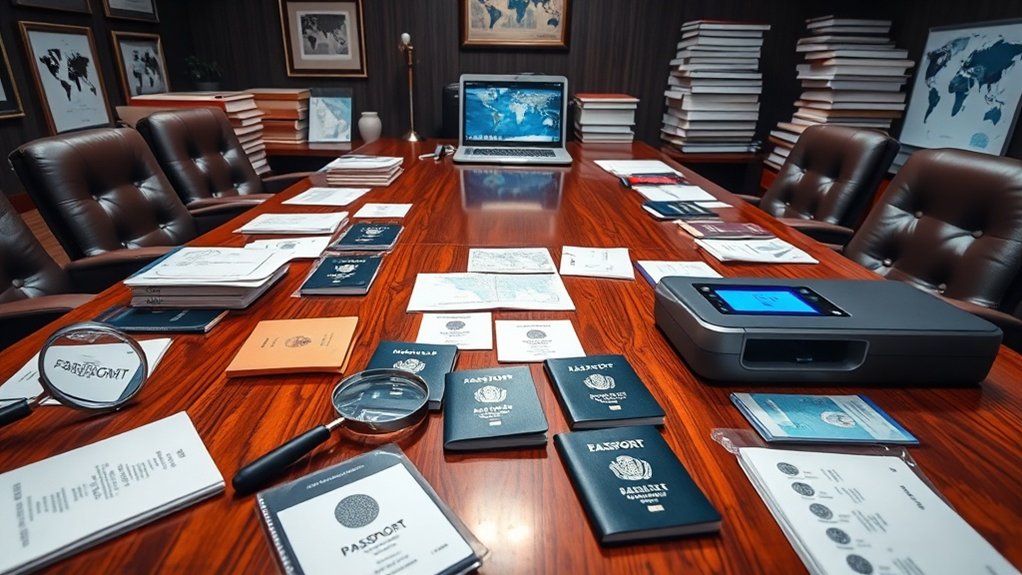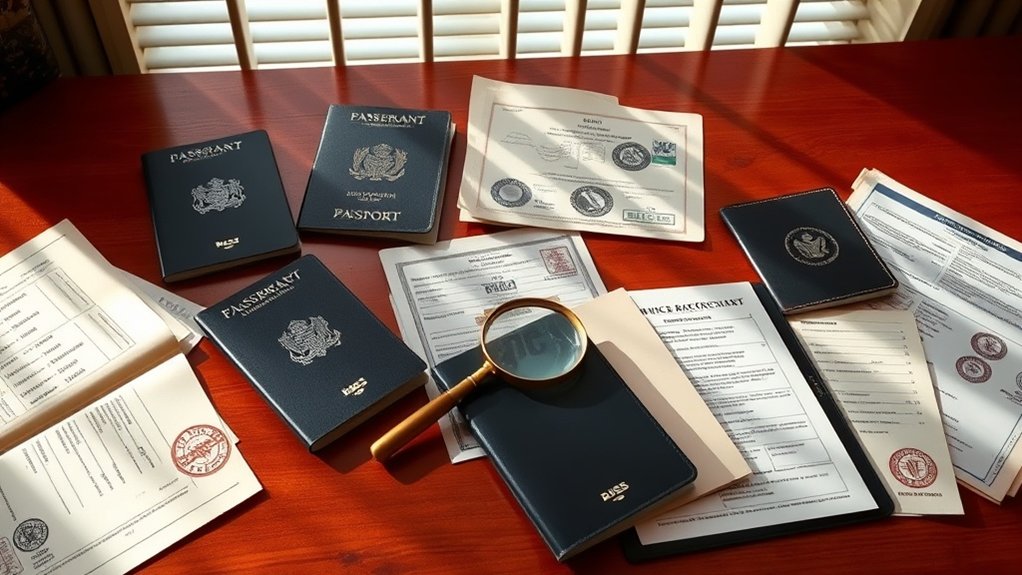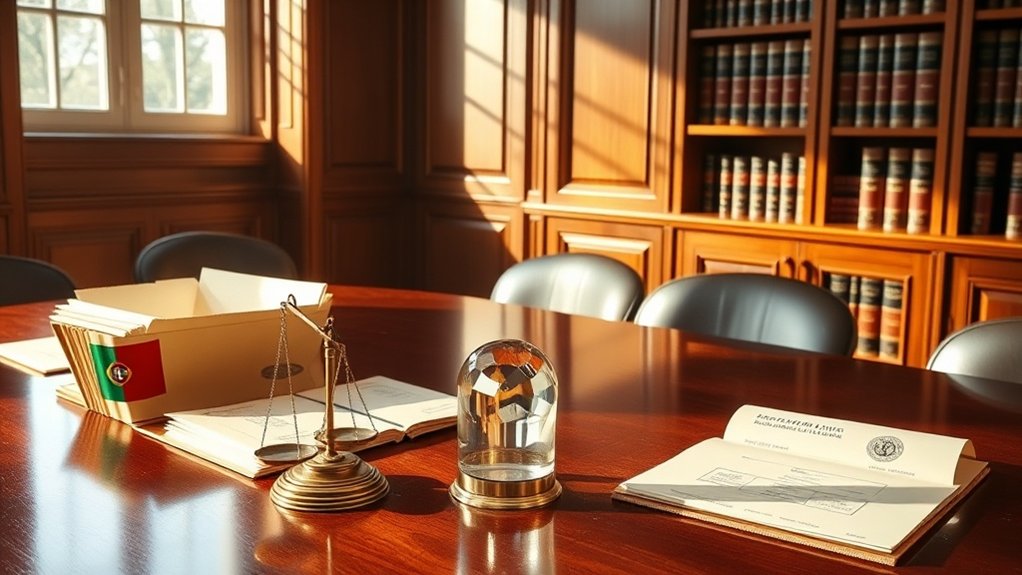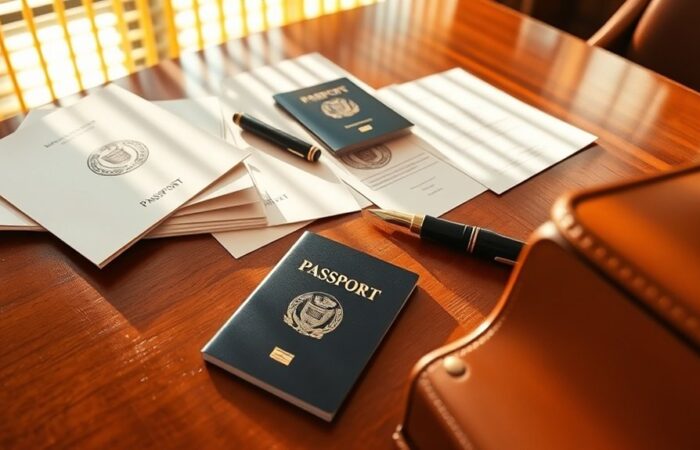You’ve likely discovered that obtaining criminal records from multiple countries where you’ve lived isn’t as straightforward as you’d hoped. Each jurisdiction operates under different legal frameworks, documentation requirements, and processing timelines that can turn what seems like a simple request into a bureaucratic maze. Whether you’re applying for immigration, employment, or professional licensing, these multi-jurisdictional background checks often become the most challenging hurdle in your application process.
The Complexity of Multi-Jurisdictional Criminal Background Verification

When you’re conducting criminal background checks, you’ll quickly discover that navigating multiple jurisdictions creates a web of complications that can trip up even experienced HR professionals. Each country operates under distinct legal frameworks, privacy laws, and procedural requirements that don’t align with one another.
You’ll encounter varying access levels to criminal records. Some nations provide comprehensive databases, while others restrict information or require specific authorization channels. Processing times differ dramatically—what takes days in one jurisdiction might require weeks in another.
Language barriers compound these challenges. You’re dealing with documents in multiple languages, different legal terminologies, and cultural nuances in how crimes are classified and recorded. Additionally, some countries don’t maintain centralized criminal databases, forcing you to check regional or local courts individually.
The authentication process adds another layer of complexity. You’ll need to verify document legitimacy across different certification standards and legal systems. Professional legal representation ensures compliance with immigration laws and helps navigate the complex documentation requirements across multiple jurisdictions.
Legal Requirements and Documentation Standards Across Different Countries
Beyond these procedural hurdles, you’ll face a maze of legal requirements that vary dramatically from country to country. Each jurisdiction maintains distinct documentation standards, authentication protocols, and processing timelines that can significantly impact your verification process.
| Country | Required Documentation | Processing Time |
|---|---|---|
| United States | FBI Identity History Summary, state-level checks | 3-5 business days |
| United Kingdom | DBS Certificate, Police Certificate | 2-8 weeks |
| Brazil | Certidão de Antecedentes Criminais | 5-15 business days |
You’ll discover that some countries require apostilled documents, while others accept digital certificates. Certain jurisdictions demand notarized translations, and processing fees range from minimal to substantial. Authentication requirements differ extensively—what’s acceptable in one country might be rejected in another.
Understanding these variations becomes crucial when you’re coordinating multiple international background checks. You’ll need to plan accordingly, ensuring each country’s specific legal framework is properly addressed to avoid delays or rejections. Simple mistakes during the criminal background checks process can result in loss of time and money, affecting your personal and professional immigration plans.
Common Challenges When Requesting Records From Former Countries of Residence

When you’re requesting criminal records from countries where you’ve previously lived, you’ll encounter several practical obstacles that can complicate the process. Language barriers often make it difficult to understand application requirements and communicate with foreign authorities, while document authentication demands can require expensive notarization or apostille services. You’ll also need to plan for significantly longer processing times compared to domestic requests, as international correspondence and verification procedures typically take weeks or months to complete. Specialized legal assistance can help navigate these complex requirements and reduce the risk of costly delays or errors in your application.
Language Barrier Issues
Although you may have successfully navigated the bureaucratic requirements for obtaining criminal records from your former country of residence, language barriers can create significant obstacles that complicate the entire process. You’ll often encounter application forms, instructions, and correspondence written exclusively in the local language, making it difficult to understand requirements or deadlines. Official documents you receive may need certified translations, adding time and expense to your request.
Communication with foreign authorities becomes challenging when you can’t effectively explain your situation or respond to their inquiries. Misunderstandings can lead to rejected applications or delays. You might struggle to verify whether you’re contacting the correct agency or following proper procedures. These language difficulties can transform what should be straightforward administrative tasks into complex, time-consuming endeavors requiring professional assistance. Engaging specialized legal support ensures proper document handling and prevents costly errors that could jeopardize your immigration application in Portugal.
Document Authentication Requirements
Once you’ve overcome language barriers and obtained your criminal records, you’ll face another layer of complexity: proving these documents are genuine. Most countries require authentication through apostilles, embassy legalization, or consular certification. This process validates your documents for international use, but requirements vary dramatically between nations.
| Authentication Method | Processing Time | Typical Cost |
|---|---|---|
| Apostille | 1-3 weeks | $50-150 |
| Embassy Legalization | 2-6 weeks | $100-300 |
| Consular Certification | 3-8 weeks | $150-500 |
You’ll need to research each country’s specific requirements since some accept apostilles while others demand full diplomatic legalization. Don’t assume one method works universally—what’s valid in Brazil might not suffice in Japan. Professional legal assistance becomes invaluable when navigating these authentication maze. Missing legal deadlines during the authentication process can lead to significant delays in your immigration application and potentially jeopardize your ability to regularize your status in Brazil.
Processing Time Delays
Even after you’ve navigated authentication requirements, time becomes your biggest enemy when requesting criminal records from former countries of residence. Processing delays can stretch from weeks to several months, depending on the country’s bureaucratic efficiency and current workload. You’ll often encounter unexpected holdups when local authorities require additional documentation or verification steps that weren’t initially specified.
Some countries prioritize domestic requests over international ones, pushing your application to the back of the queue. Holiday periods, staff shortages, and outdated systems further compound these delays. You can’t control these variables, but you can plan ahead by submitting requests as early as possible. Consider working with local legal representatives who understand each jurisdiction’s typical processing timelines and can expedite your request through proper channels. Given Brazil’s complex immigration requirements, having a specialized lawyer can help you navigate these documentation challenges while ensuring compliance with current regulations that may affect your visa application timeline.
Vieira Braga Advogados’ International Network and Specialized Expertise

When you’re navigating the complex landscape of international criminal-record checks, you’ll find that Vieira Braga Advogados brings unparalleled expertise through its extensive global network of legal professionals. You’ll benefit from direct partnerships spanning over 50 countries, ensuring seamless coordination across different legal systems and jurisdictions.
| Your Challenge | Our Solution | Your Peace of Mind |
|---|---|---|
| Language barriers blocking access | Native-speaking legal experts | Clear communication guaranteed |
| Unknown foreign procedures | Established local protocols | Streamlined processes |
| Regulatory compliance risks | Deep jurisdictional knowledge | Full legal protection |
| Time-sensitive deadlines | Priority processing channels | Accelerated results |
| Document authentication issues | Verified legal partnerships | Authentic certifications |
You won’t face bureaucratic roadblocks when working with specialists who understand each country’s unique requirements. Their expertise transforms potentially overwhelming processes into manageable, efficient procedures that protect your interests while ensuring complete compliance with international standards. This comprehensive approach helps prevent legal consequences that could arise from improper documentation or non-compliance with immigration requirements across multiple jurisdictions.
Streamlined Process for Coordinating Cross-Border Criminal Record Searches
You’ll encounter complex legal frameworks when coordinating criminal record searches across multiple jurisdictions, but streamlined processes can significantly reduce administrative burdens. Your documentation processing becomes more efficient through expedited channels that handle international requests with standardized protocols. You must ensure compliance verification standards align with each country’s specific requirements while maintaining consistency throughout the entire cross-border search process. Professional assistance minimizes common errors that could delay requests and ensures proper handling of complex documentation requirements across different immigration authorities.
Multi-Jurisdiction Legal Coordination
As organizations increasingly operate across state and national boundaries, you’ll need efficient systems to coordinate criminal record searches spanning multiple jurisdictions. Multi-jurisdiction legal coordination requires understanding diverse legal frameworks, data protection laws, and procedural requirements across different countries and states.
You’ll face challenges including varying response times, different documentation standards, and inconsistent data formats. Some jurisdictions require specific authorization forms, while others mandate direct requests through designated channels. Language barriers and time zone differences can further complicate coordination efforts.
Effective coordination involves establishing standardized request protocols, maintaining relationships with local legal representatives, and implementing tracking systems for multiple simultaneous searches. You’ll benefit from automated workflows that account for jurisdiction-specific requirements while ensuring compliance with local privacy regulations and maintaining audit trails throughout the process. Specialized legal assistance becomes essential when navigating the complex bureaucratic requirements and ensuring proper documentation across multiple international jurisdictions for criminal record verification.
Expedited Documentation Processing
Because cross-border criminal record searches often face significant delays due to bureaucratic processes, implementing expedited documentation processing becomes essential for time-sensitive hiring decisions and compliance requirements. You’ll need streamlined systems that prioritize urgent requests while maintaining accuracy and legal compliance.
Effective expedited processing requires strategic coordination across multiple jurisdictions. You can’t simply rush paperwork without proper verification protocols. Instead, you’ll establish priority channels with foreign authorities and maintain pre-authorized documentation templates.
Key components of expedited processing include:
- Priority queue systems for urgent business requirements and compliance deadlines
- Pre-verified documentation templates that meet multiple jurisdictions’ standards simultaneously
- Digital authentication protocols that reduce physical document transfer times
- Direct liaison relationships with foreign criminal record offices for faster communication
This approach significantly reduces processing timeframes while ensuring thoroughness. Given the complexity of immigration laws and constantly changing regulations, working with specialized legal knowledge helps ensure that criminal record documentation meets all requirements across different jurisdictions and immigration processes.
Compliance Verification Standards
While expedited processing speeds up documentation timelines, establishing robust compliance verification standards ensures your cross-border criminal record searches meet each jurisdiction’s legal requirements without compromising accuracy. You’ll need to verify that each country’s specific authentication protocols are properly followed, including apostille certifications, notarization requirements, and translation standards.
Your verification process should include checking document formats against local regulations, confirming authorized signature requirements, and ensuring proper chain of custody documentation. You must validate that background check providers maintain current licenses in each jurisdiction and follow data protection laws like GDPR or local privacy regulations.
Ensuring Compliance With Requesting Authority Requirements and Timelines
When you submit a criminal-record check request, you’re entering into a process governed by strict regulatory requirements and deadlines that vary significantly depending on the requesting authority. Each jurisdiction maintains specific protocols that must be followed precisely to avoid delays or rejections.
Understanding these requirements is crucial for successful compliance:
- Documentation standards – Ensure all required forms are completed accurately with proper notarization and apostille certification where needed
- Timeline adherence – Submit requests within specified deadlines, accounting for processing times that can range from days to months
- Authentication protocols – Follow exact procedures for document verification, including translation requirements and official seals
- Communication channels – Use designated submission methods and maintain proper correspondence with authorities throughout the process
You’ll need to track multiple deadlines simultaneously when dealing with requests from different countries. Missing any requirement can result in costly delays or complete rejection of your application, potentially affecting your professional or personal objectives.
Frequently Asked Questions
How Much Does It Cost to Obtain Criminal Records From Multiple Countries?
You’ll find costs vary significantly depending on which countries you’re requesting records from. Each nation sets its own fees, ranging from $20 to $200 per country. Processing times and requirements differ too. You’ll need to budget for translation services, apostille certifications, and shipping costs. Contact each country’s relevant authority directly for exact pricing, or hire a legal service to handle the entire process for you.
How Long Does the Entire Multi-Country Criminal Background Check Process Typically Take?
You’ll typically wait 4-12 weeks for multi-country criminal background checks, though timing varies significantly by country. Some nations like the UK or Canada process requests within 1-2 weeks, while others can take 8-10 weeks or longer. Processing delays often occur due to varying bureaucratic procedures, holidays, and documentation requirements. You can expedite the process by ensuring all paperwork’s complete and accurate before submission.
Can You Help if I Don’t Have Documents From My Previous Residences?
Yes, we can definitely help you obtain missing documents from previous residences. We’ll guide you through requesting replacement documents from relevant authorities, whether that’s police departments, government agencies, or consular offices. Our team knows the specific requirements for each country and can assist with proper application procedures, required forms, and any apostille or legalization processes needed for international document recognition.
Do You Provide Certified Translations of Foreign Criminal Record Documents?
Yes, we provide certified translations of foreign criminal record documents. You’ll need these translations to ensure your documents are legally recognized in Brazil. Our team works with qualified translators who specialize in legal documents and can certify that your foreign criminal records meet Brazilian legal requirements. We’ll handle the entire translation process to ensure your documents are properly prepared for submission.
What Happens if a Country Refuses to Release My Criminal Records?
If a country refuses to release your criminal records, you’ll need to obtain an official letter from that country’s authorities explaining why they can’t provide the documents. This refusal letter serves as evidence that you’ve attempted to comply with requirements. You can then submit this letter to whoever requested your criminal records, along with documentation showing your good-faith effort to obtain them.
Conclusion
You’ll find that navigating multi-jurisdictional criminal background checks doesn’t have to overwhelm you. With Vieira Braga Advogados’ specialized expertise and international network, you’re getting streamlined coordination that cuts through complex legal requirements and language barriers. You won’t waste time struggling with unfamiliar documentation standards or missing critical deadlines. Instead, you’ll receive accurate, compliant results that meet your requesting authority’s specific requirements, allowing you to focus on what matters most to your organization.






